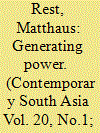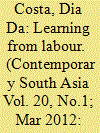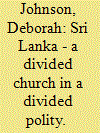|
|
|
Sort Order |
|
|
|
Items / Page
|
|
|
|
|
|
|
| Srl | Item |
| 1 |
ID:
111512


|
|
|
|
|
| Publication |
2012.
|
| Summary/Abstract |
In May 2009, Sri Lankan government armed forces defeated the Liberation Tigers of Tamil Eelam (LTTE) after more than a quarter of a century of civil war. With the elimination of most of the LTTE leadership and the waning of its hold over Tamils in Sri Lanka and abroad, the scene was set for a transformation of relations between the diaspora and those at home. It is the dynamics of this transformation that we explore in this article, which traces the shifting centre of gravity in Tamil politics between actors in the homeland and those in the diaspora. Drawing on Bourdieu's notion of a 'political field', we characterise what we call the local, diasporic and transnational political fields in the Sri Lankan setting. This article shows how the LTTE's power derived largely from its control of the transnational political field, including in places that were otherwise isolated from diasporic connections. The defeat in 2009 fundamentally changed the dynamics of transnational politics by greatly weakening the LTTE's grip over the transnational political field, and this article explores the new dispensation that is now unfolding.
|
|
|
|
|
|
|
|
|
|
|
|
|
|
|
|
| 2 |
ID:
111514


|
|
|
|
|
| Publication |
2012.
|
| Summary/Abstract |
This article presents the Indian electricity sector as a case study of the evasion of responsibility in public policy. India's electricity policy repeatedly fails to meet its own targets and is universally lambasted as inadequate. The state appears aware of many of the reasons for these failures, yet policies have consistently failed to make effective corrections. Part of the explanation for this institutional and policy stasis lies in the pervasive shirking of responsibility by actors throughout the electricity sector. The sector is analysed to explore the mechanisms through which responsibility is displaced, deflected or dissipated. These mechanisms include 'agency', 'presentational' and 'policy' strategies, which are both pre-emptively and reactively deployed. Using these strategies, responsibility is shifted through (1) institutional architecture which formally delegates power to other actors, especially exploiting the ambiguity in federalism, sectoralism, privatization and decentralization; (2) rhetorical displacement of blame onto other actors or 'exogenous' factors and (3) everyday policy procedures and bureaucratic practices designed to distance officials from decision making. By negating the requirement for institutional and analytical responsiveness, these evasions of responsibility perpetuate systemic failures and undermine the credibility of the Indian state.
|
|
|
|
|
|
|
|
|
|
|
|
|
|
|
|
| 3 |
ID:
111517


|
|
|
|
|
| Publication |
2012.
|
| Summary/Abstract |
Through a brief history of a widely published canon debate in nineteenth century Orissa, this article describes how anxieties about the quality of 'traditional' Oriya literature served as a site for imagining a cohesive Oriya public who would become the consumers and beneficiaries of a new, modernized Oriya-language canon. A public controversy about the status of Oriya literature was initiated in the 1890s with the publication of a serialized critique of the works of Upendra Bhanja, a very popular pre-colonial Oriya poet. The critic argued that Bhanja's writing was not true poetry, that it did not speak to the contemporary era, and that it featured embarrassingly detailed discussions of obscene material. By unpacking the terms of this criticism and Oriya responses to it, I reveal how at the heart of these discussions were concerns about community building that presupposed a new kind of readership of literature in the Oriya language. Ultimately, this article offers a longer, regional history to the emerging concern of post-colonial scholarship with relationships between publication histories, readerships, and broader ideas of community - local, Indian, and global.
|
|
|
|
|
|
|
|
|
|
|
|
|
|
|
|
| 4 |
ID:
111515


|
|
|
|
|
| Publication |
2012.
|
| Summary/Abstract |
Contested since 1990, the Arun-3 dam in Nepal has so far generated more heat than hydropower involving a host of complex negotiations between its advocates and critics on the local, national and transnational levels. Cancelled after a complaint before the World Bank Inspection Panel in 1995, work is soon to be resumed. An Indian public sector company interested in exporting the electricity to India will finance it. This paper focuses on how local communities have experienced the decade-long uncertainties concerning the project and the approach road to be built. Their hopes of access to markets, electrification and a modern lifestyle will be explored in the context of an understanding of development as a desiring machine and governmentality studies. I will argue for a parallel application of the two approaches to conceptualize the entanglement of desires for development and a deep sense of local powerlessness vis-a-vis external actors.
|
|
|
|
|
|
|
|
|
|
|
|
|
|
|
|
| 5 |
ID:
111510


|
|
|
|
|
| Publication |
2012.
|
| Summary/Abstract |
This paper examines the experience of Indians studying at the London School of Economics and Political Science (LSE) under Professor Harold Laski between 1920 and 1950. Focusing on a group of students who became important figures in Indian public life following graduation, I argue that the experience of LSE and Laski deepened these students' understanding of the dilemmas India faced in the decades before independence. In particular, pupils broadened their sense of India's challenges from a prior focus on attaining independence to an increasing emphasis on inequality and social problems.
|
|
|
|
|
|
|
|
|
|
|
|
|
|
|
|
| 6 |
ID:
111509


|
|
|
|
|
| Publication |
2012.
|
| Summary/Abstract |
This article deals with the judicialization of politics in Pakistan under the Supreme Court Chief Justice Choudhry (2009-). Confrontation between the executive and judiciary under him led to speculation about the imminent collapse of the democratic system, given the history of military take-over in the country. The use of judicial review, whereby the Court exercised the power of interpreting the Constitution with impunity, was widely criticized as an attempt to encroach on the territory of the legislature through case law. At the institutional level, the Court sought to exercise veto power over the appointment of judges and to deny the right of oversight to any government agency. The Court's pursuit of public interest litigation through frequent suo motu actions taken in a populist mode led to brinkmanship on the part of the executive and judiciary. Despite this power play, the Court's operations fell into the category of modus operandi, instead of being a fight to the finish. However, the Court's pursuit of judicial reform relating to cheap and speedy justice and accountability of the higher judiciary remained far from satisfactory.
|
|
|
|
|
|
|
|
|
|
|
|
|
|
|
|
| 7 |
ID:
111516


|
|
|
|
|
| Publication |
2012.
|
| Summary/Abstract |
Recent attempts to rethink labour history and contemporary labour struggles in India have variously memorialised the 'lost worlds' of industrial labour struggle and argued for stretching the terms of labour historiography, in part, by moving beyond the conceptual and political boundaries of the factory gate to take into account the complex configurations of labour, accumulation and struggle. This article contributes to this scholarship with a methodological focus on political theatre by three organisations in India. I ask what we might learn about labour and labour struggles when we look through the lens of cultural activism by the urban and rural poor. Drawing on Kalyan Sanyal's provocative distinction between accumulation and need economy, I argue that contemporary cultural work and activism both refuses and contributes to the market-based fetishisation of surplus-value as the sole purpose of work and as such it founds a view of labour and labour struggle that learns from labour and not just capital.
|
|
|
|
|
|
|
|
|
|
|
|
|
|
|
|
| 8 |
ID:
111508


|
|
|
|
|
| Publication |
2012.
|
| Summary/Abstract |
In order to trace the trajectory of women's gains and losses since Bangladesh's independence over four decades ago, the centrality of women's bodies is brought to the fore. This is illustrated through the campaign work surrounding the movement to oppose violence against women and the struggle for sex workers' rights, where discourses of bodies are shown to be pertinent for the struggle for representation, and establishing women's rights in these domains. The roots of these struggles are, however, closely linked to the liberation struggle in the early 1970s, showing that contemporary areas of social contestation have a long history. This is an adaptation of the keynote address given at the 25th Anniversary Conference of the British Association of South Asian Studies, University of Southampton, 11-13 April 2011.
|
|
|
|
|
|
|
|
|
|
|
|
|
|
|
|
| 9 |
ID:
111511


|
|
|
|
|
| Publication |
2012.
|
| Summary/Abstract |
This article is an attempt to critique the positivist neo-liberal orthodoxy in the measurement of poverty. I have argued that this orthodox approach systematically underestimates the extent of poverty and undermines welfare-oriented developmental policies. Taking Nepal as an illustration, this article demonstrates that the emergence of multiple poverty estimates has provided a choice to the development policy-makers and practitioners in the global south. It argues that while both the dominant national poverty and $1.25 a day poverty estimates distort and downsize the dimensions and extent of poverty, the Multidimensional Poverty Index (MPI) is a better reflection of multiple faces of poverty and the level of poverty perceived by the people. It has been argued that the former two money-metric poverty estimates lend support to a neo-liberal perspective on reducing the role of the welfare state. Anti-poverty policy-making faces a choice between two alternatives: the risk-based and targeted safety net approach implied by the money-metric poverty estimates; and the capability and rights-based approach that favours universal social security implied by the MPI estimates. The empirical evidence from Nepal demonstrates the inadequacy of the money-metric approach and the strength of the capability and rights-based approach for reducing poverty through the universalisation of the welfare state.
|
|
|
|
|
|
|
|
|
|
|
|
|
|
|
|
| 10 |
ID:
111513


|
|
|
|
|
| Publication |
2012.
|
| Summary/Abstract |
In different fields of academia today there is renewed interest in the relationship between religion and politics. However, this literature often focuses on beliefs such as extremism and nationalism at the expense of historically contextualized discussion about the organization and practices associated with religion. As analysts observe the 'retreat' of the promise of secular modernity, it is easy to be left with little or no grounded understanding of how religious organizations are engaging in spaces of contested politics or how this engagement can help us to understand more appropriately what 'religion' or 'politics' mean to individuals and communities on personal and organizational levels. Within this broader debate, this paper introduces a research project that explores one form of religious practice: the ability of religious leaders to cross violent or politicized borders in times of contestation and conflict. The empirical focus on the Sri Lankan Catholic Church, in Tamil areas in the north, presents the activity of priests in such circumstances as a form of 'brokerage', facilitated and constrained by their religious, institutional setting.
|
|
|
|
|
|
|
|
|
|
|
|
|
|
|
|
|
|
|
|
|